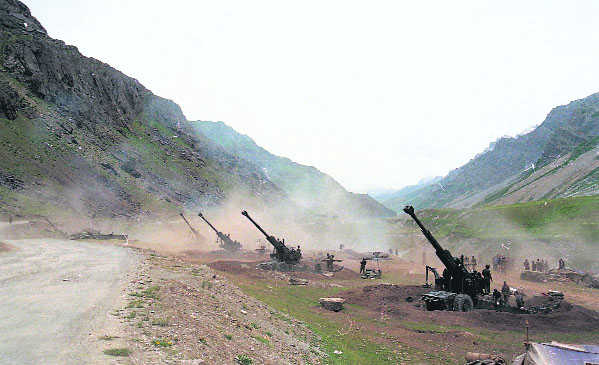
There was streamlining of our intelligence architecture after the Kargil war. Manpower shortage in Intelligence outfits needs attention
Lt-Gen Kamal Davar (retd)
Whenever a nation or any institution of the state gets surprised or is struck by a cataclysmic event like a security calamity or a major breach in its functioning, the most convenient fallout is to apportion blame to an intelligence failure! The real reasons may lie elsewhere -- be it a systemic shortcoming, leadership failure, non-adoption of the Standard Operating Procedures or non-adherence to simple prophylactic measures.
Intelligence, even in democracies, is hardly ever scrutinised or revisited for the cloak of traditional secrecy masks all its strengths and shortcomings. Practitioners of this vocation also, by and large, zealously endeavour to wrap their craft, and by extension their failures, by employing the terms “cannot be disclosed in national interest” or sophisticatedly as “privileged information”.
First line of defence
India is situated astride one of the most violent expanses in the world and myriad threats to its well-being are continually escalating, both in the external and internal dimensions. Thus it is imperative for the nation’s decision-makers to accord the necessary priority to the sharpening of the intelligence organs of the state for intelligence remains the first line of defence. Regrettably, India does not display either a security culture or intelligence consciousness.
India has been surprised on numerous occasions, notably in 1962, preceding the India-Chinese conflict, then again by Pakistan’s perfidy in Kargil in 1999, by the attack on India’s Parliament in 2001, which nearly led to an Indo-Pak war, the tragic and avoidable assassinations of Prime Ministers Indira Gandhi in 1984 and Rajiv Gandhi in 1991.
All these point to the moot question whether India has given adequate importance to this specialised discipline for effective decision-making and actions duly warranted by credible information.
After the Kargil war and the Pakistan ISI-engineered terror attacks in Mumbai in 2008, there have been some much-desired accretions to and streamlining of our intelligence architecture.
Thanks to the Kargil Review Committee and subsequently the Group of Ministers Committee on Intelligence, the raising of the Defence Intelligence Agency (DIA) in 2002 to coordinate inter-services intelligence, formerly National Technical Facilities Organisation (NTRO), now re-christened as National Technical Resources Organisation (NTRO) and the National Information Board were raised.
Manpower shortage
After the Mumbai 2008 terror attack, the National Investigation Agency and NATGRID were raised and are performing well. However, the National Counter-Terrorism Centre is still to be established. In addition, our intelligence in Naxal/ Maoist-infested areas remains a cause of concern.
The shortage of suitable manpower in intelligence outfits needs to be speedily resolved and knee-jerk reactions by milking other intelligence/ police organisations is hardly the permanent answer.
Intelligence being a specialised domain, the government may consider the introduction of a specialised intelligence cadre (both as Grade 1 and 2 services) to staff the civil intelligence agencies, some could find their way to the armed forces intelligence set-ups.
Direct recruitment from technical universities and colleges for manning highly specialised cyber security outfits and the NTRO/ technical outfits of the DIA will be eminently desirable.
Qualified manpower
It must be appreciated that, like combat capabilities, the requisite levels of intelligence preparedness take long to accomplish. More than technical intelligence (TECHINT), an area where non-state actors, terrorists and money launderers are now getting hyper skilled and highly innovative, the prowess in vital human intelligence capability invariably falls short.
Intelligence agencies, especially in TECHINT, require adequate personnel trained in foreign and indigenous languages. It is perhaps an unknown fact to the public that now over 80 per cent of the intelligence is gathered through “open sources”, meaning the printed and the electronic media, journals, internet, tourists and the like.
Inter-disciplinary experts will also be required to sift and analyse this huge information overload. The prevention and investigation of financial crimes — the backbone of many terror-driven operations — requires specialised and qualified manpower.
Importantly, India has to decide that, on the lines of the US, do we need to have a national coordinator of intelligence or let the present system continue where the Chairman, Joint Intelligence Committee(JIC), reports to the National Security Adviser (NSA)?
India’s first NSA, the formidable Brajesh Mishra, in addition to his duties, which also included being the Principal Secretary to the Prime Minister, was also coordinating all intelligence agencies and was informally referred to as the “Intelligence Czar”!
It would perhaps be appropriate for an appointment of, say a Coordinator National Intelligence (CNI), who could devote his full time to the oversight and coordination of all intelligence agencies, analyse their inputs with the JIC under him and then put up his integrated assessments to the government through the NSA.
Accountability
It must be appreciated that intelligence agencies are not the salvation army and need to develop both overt and covert capabilities to carry out their tasks effectively. Thus the nation must accord them the necessary legal sanction, resources and wherewithal.
Importantly, their effectiveness and working can be scrutinised by the government in an institutionalised manner, say every 10 years and corrective measures adopted. The introduction of, and the degree of parliamentary oversight on, intelligence agencies need a detailed and informed debate.
A nation, which desires to occupy a seat on the global high table, has to have effective, high-performing “eyes and ears” with a long reach, albeit silent, self-sustaining and strong. Indian intelligence confronts formidable challenges in the domains of land, sea, sky, cyber, nuclear and now space. It will be in the nation’s interest to give it the necessary muscle.
(The writer raised India’s Defence Intelligence Agency after the Kargil war)



























